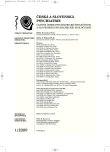-
Medical journals
- Career
Patient’s Subjective Well-being with Antipsychotic Treatment
Authors: J. Masopust 1; J. Libiger 1; R. Köhler 1; A. Urban 1; Eva Čermáková 2
Authors‘ workplace: Psychiatrická klinika LF UK a FN, Hradec Králové ; přednosta prof. MUDr. J. Libiger, CSc. Katedra lékařské biofyziky LF UK, Hradec Králové 1; přednosta doc. Ing. J. Hanuš, CSc. 2
Published in: Čes. a slov. Psychiat., 105, 2009, No. 1, pp. 12-19.
Category: Original Article
Overview
Objectives:
The factors that influence compliance with antipsychotic treatment in schizophrenia are related to the patient, the patient’s environment, the attending physician, and the treatment itself. Important causes of nonadherence are adverse effects (AEs) of antipsychotics. Initial dysphoric reaction, sedation, extrapyramidal symptoms, akathisia, sexual dysfunction and obesity belong to the most frequent AEs. The patient’s subjective well-being and attitude toward antipsychotic medication are considered to be important for compliance.Methods:
Severity of symptoms was estimated using the PANSS (Positive and Negative Symptoms of Schizophrenia) and CGI (Clinical Global Impression) scales. Self-rating Well-being Neuroleptic Scale (SWN) was applied to evaluate the patients´ subjective well-being. We also administered the Drug Attitude Inventory (DAI) to evaluate the attitude of the study subjects toward antipsychotic medication.Results:
Seventy-five outpatients (women N = 25) at the average age of 34.6 years (median 32 years) with the diagnosis of schizophrenia were included into the study. The patients with the most pronounced subjective well-being were in remission, treated with monotherapy, and low doses of antipsychotic drugs.Conclusion:
Subjective well-being is increasingly being accepted as a valid and important measure of antipsychotic treatment outcomes and tolerability. Meaningful way of antipsychotic treatment in monotherapy with minimal AEs can increase the patient’s subjective well-being and compliance.Key words:
subjective well-being, attitude toward medication, monotherapy, remission, adverse events of antipsychotic drugs, adherence.
Sources
1. Andreasen, N. C., Carpenter, W. T., Kane, J. M., Laser, R. A., Marder, S. R., Weinberger, D. R.: Remission in schizophrenia: proposed criteria and rationale for consensus. Am. J. Psychiatry, 162, 2005, pp. 441-449.
2. Awad, A. G., Voruganti, L. N.: Neuroleptic dysphoria: revisiting the concept 50 years later. Acta Psychiatr. Scand. Suppl., 2005 (427), pp. 6-13.
3. Centorrino, F., Goren, J. L., Hennen, J., Salvatore, P., Kelleher, J. P., Baldessarini, R. J.: Multiple versus single antipsychotic agents for hospitalized psychiatric patiens: case-control study of risks versus benefits. Am. J. Psychiatry, 161, 2004, pp. 700-706.
4. Correll, C. U., Frederickson, A. M., Kane, J. M., Manu, P.: Does antipsychotic polypharmacy increase the risk for metabolic syndrome ? Schizophr. Res., 89, 2007, pp. 91-100.
5. Češková, E.: Schizofrenie a její léčba. 2. vydání. Praha, Maxdorf, 2007, 104 s.
6. Day, J. C., Bentall, R. P., Roberts, C., Randall, F., Rogers, A., Cattell, D., Healy, D., Rae, P., Power, C.: Attitudes toward antipsychotic medication. Arch. Gen. Psychiatry, 62, 2005, pp. 717-724.
7. Fleischhacker, W. W., Oehl, M. A., Hummer, M.: Factors influencing compliance in schizophrenia patients. J. Clin. Psychiatry, 64 (Suppl. 16), 2003, pp. 10-13.
8. Hogan, T. P., Awad, A. G., Eastwood, R.: A self-report scale predictive of drug compliance in schizophrenics: reliability and discriminative validity. Psychol. Med., 13, 1983, pp. 177-183.
9. Hogan, T. P., Awad, A. G.: Subjective response to neuroleptics and outcome in schizophrenia: a re-examination comparing two measures. Psychol. Med., 22, 1992, pp. 347-352.
10. Joukamaa, M. et al.: Schizophrenia, neuroleptic medication and mortality. Br. J. Psychiatry, 188, 2006, pp. 122-127.
11. Libiger, J.: Neuroleptická dysforie v éře antipsychotik: nové otázky. Psychiatrie, 8 (Suppl. 1), 2004, s. 25.
12. Naber, D., Karow, A., Lambert, M.: Subjective well-being under neuroleptic treatment and its relevance for compliance. Acta Psychiatrica Scand. Suppl., 2005 (427), pp. 29-34.
13. Naber, D.: A self-rating to measure subjective effects of neuroleptics drugs, relationship to objective psychopatology, duality of life, compliance and other clinical variables. Int. Clin. Psychopharmacol, 10 (Suppl. 3), 1995, pp. 133-138.
14. Nábělek, L., Šajgalíková, I., Fašková, L., Kašparová, Z.: Subjektívne prežívanie antipsychotickej liečby. Čes a slov Psychiat, 96, 2000, s. 195-199.
15. Perkins, D. O., Gu, H., Weiden, P. J., McEvoy, J. P., Hamer, R. M., Lieberman, J. A.: Predictors of treatment discontinuation and medication nonadherence in patients recovering from a first episode of schizophrenia, schizophreniform disorder, or schizoaffective disorder: a randomized, double-blind, flexible-dose, multicenter study. J. Clin. Psychiatry, 69, 2008, pp. 106-113.
16. Švestka, J., Bitter, I.: Nonadherence to antipsychotic treatment in patients with schizophrenic disorders. Neuroendocrinol Lett, 28 (Suppl 1), 2007, pp. 95-116.
17. Van Putten, T., May, P. R.A, Marder, S.R.: Subjective response to antipsychotic drugs. Arch. Gen. Psychiatry, 38, 1981, pp. 187-190.
18. Van Putten, T., May, P. R. A, Marder, S. R.: Akathisia with haloperidol and thiothixene. Arch. Gen. Psychiatry, 41, 1984, pp. 1036-1039.
19. Waddington, J. L. et al.: Mortality in schizophrenia. Antipsychotic polypharmacy and absence of adjunctive anticholinergics over the course of a 10-year prospective study. Br. J. Psychiatry, 173, 1998, pp. 325-329.
20. Wainmann, S., Hoerger, S., Erath, M., Kilian, R., Gaebel, W., Becker, T.: Implementation of a schizophrenia practice guideline: clinical results. J. Clin. Psychiatry, 69, 2008 (Published online ahead of print).
Labels
Addictology Paediatric psychiatry Psychiatry
Article was published inCzech and Slovak Psychiatry

2009 Issue 1-
All articles in this issue
- Perception of Restriction and Coercion during Nonvoluntary (Imposed) Hospitalization and after Dismissal
- Patient’s Subjective Well-being with Antipsychotic Treatment
- Possibility of Aggressiveness Evaluation by Means of Projection Tests in Psychiatric Patients
- Stress in the Psychiatric Nursing
- Therapy of Patient with Dementia Directed to Orientation in Reality
- Czech and Slovak Psychiatry
- Journal archive
- Current issue
- Online only
- About the journal
Most read in this issue- Possibility of Aggressiveness Evaluation by Means of Projection Tests in Psychiatric Patients
- Stress in the Psychiatric Nursing
- Therapy of Patient with Dementia Directed to Orientation in Reality
- Perception of Restriction and Coercion during Nonvoluntary (Imposed) Hospitalization and after Dismissal
Login#ADS_BOTTOM_SCRIPTS#Forgotten passwordEnter the email address that you registered with. We will send you instructions on how to set a new password.
- Career

